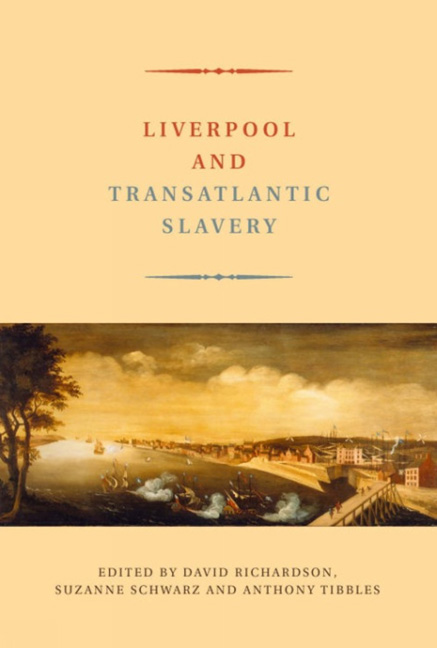Book contents
- Frontmatter
- Content
- Preface
- Notes on Contributors
- Introduction Liverpool, the African Slave Trade and Abolition Thirty Years On
- 1 Liverpool's Dominance in the British Slave Trade, 1740–1807
- 2 African Agency and the Liverpool Slave Trade
- 3 Human Capital in the British Slave Trade
- 4 Liverpool's Slave Trade to the Colonial Chesapeake: Slaving on the Periphery
- 5 The Liverpool Slave Trade, Lancaster and its Environs
- 6 The Atlantic Slave Trade and African Ethnicities in Seventeenth-Century Jamaica
- 7 The Wealth and Social Aspirations of Liverpool's Slave Merchants of the Second Half of the Eighteenth Century
- 8 ‘Cemented by the Blood of a Negro’? The Impact of the Slave Trade on Eighteenth-Century Liverpool
- 9 Commerce, Civilization and Christianity: The Development of the Sierra Leone Company
- 10 Abolitionism in Liverpool
- Index
1 - Liverpool's Dominance in the British Slave Trade, 1740–1807
- Frontmatter
- Content
- Preface
- Notes on Contributors
- Introduction Liverpool, the African Slave Trade and Abolition Thirty Years On
- 1 Liverpool's Dominance in the British Slave Trade, 1740–1807
- 2 African Agency and the Liverpool Slave Trade
- 3 Human Capital in the British Slave Trade
- 4 Liverpool's Slave Trade to the Colonial Chesapeake: Slaving on the Periphery
- 5 The Liverpool Slave Trade, Lancaster and its Environs
- 6 The Atlantic Slave Trade and African Ethnicities in Seventeenth-Century Jamaica
- 7 The Wealth and Social Aspirations of Liverpool's Slave Merchants of the Second Half of the Eighteenth Century
- 8 ‘Cemented by the Blood of a Negro’? The Impact of the Slave Trade on Eighteenth-Century Liverpool
- 9 Commerce, Civilization and Christianity: The Development of the Sierra Leone Company
- 10 Abolitionism in Liverpool
- Index
Summary
One of the best–known f eatures of eighteenth–century British commercial history is the prominence of Liverpool as a slave–trading port. After the London–based Royal African Company's monopoly in the slave trade ended in 1698, Liverpudlians entered the ‘Guinea’ business slowly: they dispatched only two slaving vessels in the first decade of the eighteenth century when the slave trade had just become legally open to private merchants. The Mersey port's slave–trading activity rose significantly, however, after the end of the War of the Spanish Succession and continued to grow rapidly thereafter. Forty–two slave ships cleared out from Liverpool in the period 1721–30 and 197 between 1731 and 1740; these represented 6 per cent and 27 per cent respectively of the slave ships leaving Britain. Liverpool then overtook London and Bristol, the other two large British slave trading centres. Liverpool sent out 217 slaving ships in the period 1741–50 – 43 per cent of the vessels dispatched in the British slave trade. A continuous rise after the mid–1740s led Liverpool to a commanding position in the trade. Bristol and London, by contrast, had more fluctuating involvement in the slave trade in the second half of the eighteenth century.
In 1751–60 Liverpool dispatched ships on 500 slaving ventures, which gave her a 56 per cent share of ships embarked on slaving voyages from Britain. In 1761–70, 1771–80 and 1781–90 Liverpool dispatched 684, 608 and 579 slaving voyages, accounting respectively for shares of 54, 60 and 70 per cent of slaving ventures from Britain. Liverpool sent out 910 slave ships between 1791 and 1800 and 790 in the final years of the British slave trade from 1801 to 1807. In those two periods 77 and 79 per cent of the slaving voyages leaving Britain were from the Mersey. Liverpool probably invested around £200,000 in the slave trade in 1750 and more than £1 million in 1800. In 1807 Liverpool had an annual investment of £2,641,200 in the slave trade. It was dubbed ‘the metropolis of slavery’. Throughout the entire period of the British slave trade Liverpool ships delivered an estimated 1,171,171 slaves to the New World, making it the most important port of departure for transatlantic slaving voyages before the nineteenth century.
- Type
- Chapter
- Information
- Liverpool and Transatlantic Slavery , pp. 14 - 42Publisher: Liverpool University PressPrint publication year: 2007



